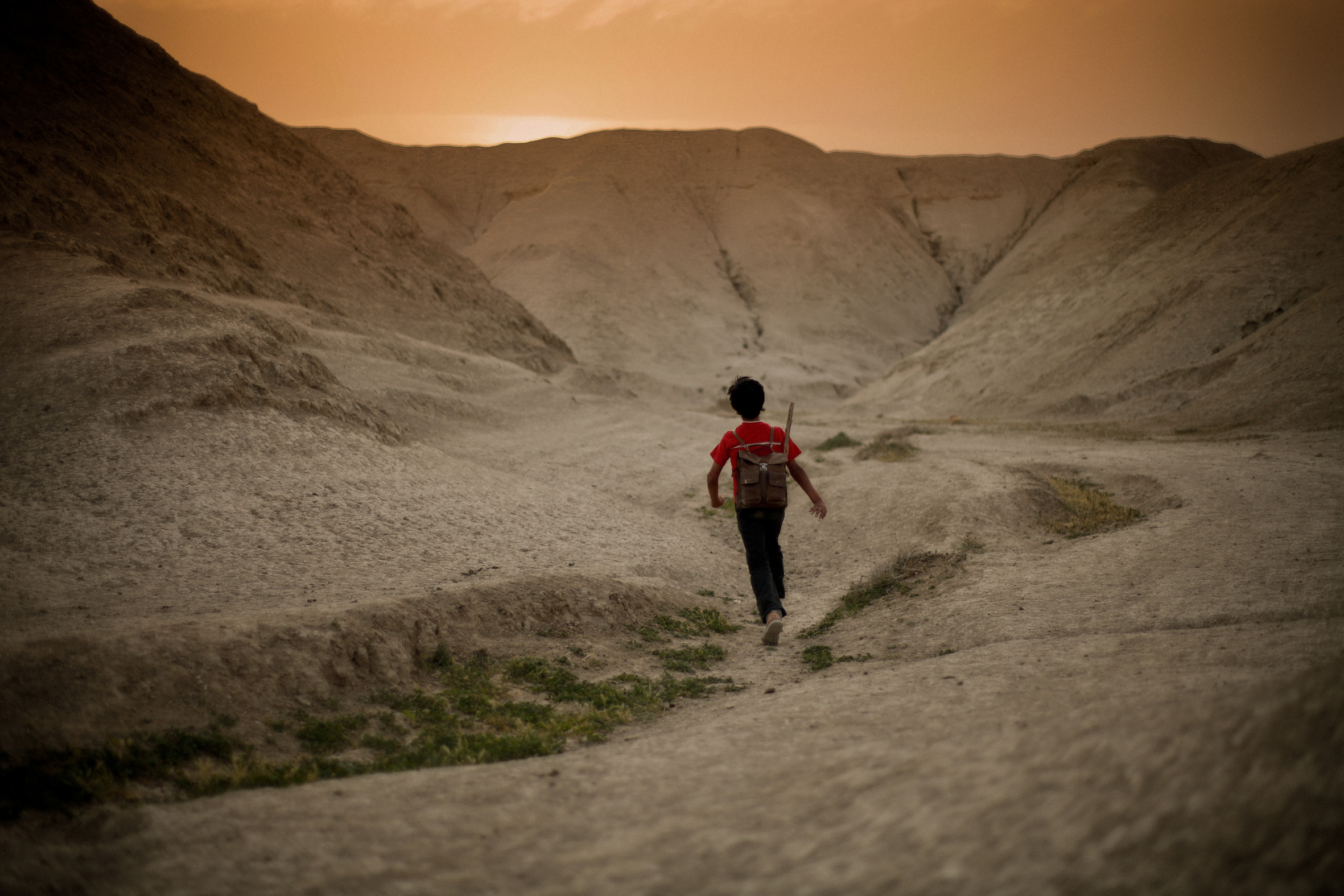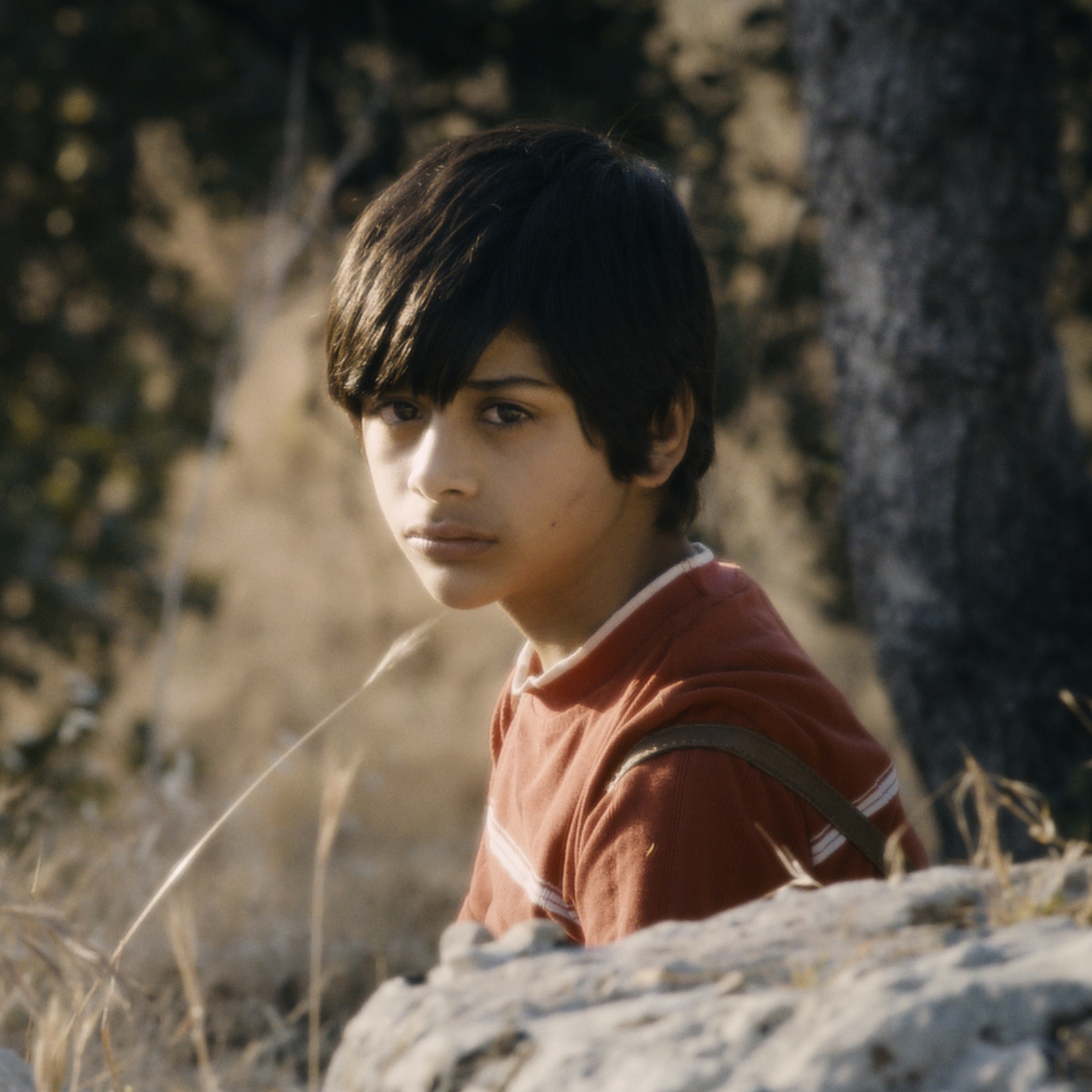Some people follow the masses. Others follow the sun.
Jordan, 1967. In the wake of the fateful Six Day War, Tarek and his mother, along with scores of displaced Palestinians find themselves in the midst of a ramshackle refugee camp in the barren, arid countryside near the Israeli border. Unlike his doting mother or his school chums, who seemingly accept their fate and carry on with their lives, Tarek decides early on that he’s not going to have any of it. A precocious (albeit illiterate) doe-eyed lad with mop-topped hair, a penchant for roller-skates, and an unflinching tendency to speak his mind, his only longing is to be free. For Tarek, this means no more slimy food, no more expulsions from school, and above all, a return to his ancestral homeland, where his absent father may or may not be. After soon coming to grips with his new predicament, Tarek realises that it’s up to him alone to change things. As he whiles away yet another drab day at a smoky makeshift café, pregnant with the thick smell of coffee and the rattle of rolling dice, a peculiar figure appears on the fuzzy television screen above. Wearing a keffiyeh and black sunglasses, looking not unlike an Arab Ringo Starr, he speaks in broken English to a British reporter about Palestine, captivating the attention of Tarek and the rest of the café’s denizens, who momentarily pause their bouts of shesh besh. ‘What does this mean?’, the young boy asks. ‘It means we can go home’, someone beside him responds. The bespectacled man is none other than Yasser Arafat.
For the young, rebellious lad, the comment is all the justification and affirmation he needs to break away from the confines of the squalid camp. Elated, he decides to follow a ragtag band of rebels far beyond the borders of his world, ‘where the sun sets everyday’, and it’s not long before he finds himself alone in the desert, without a soul in the dead of night. Fortunately for Tarek, the scruffy, frayed face of one of the rebels is the first thing he sees upon opening his eyes the next morning. ‘Are you in the army?’ asks the lad. ‘Well, sort of’. Tarek’s friend Layth, it appears, is a Fedayee – a Palestinian freedom fighter, who like Tarek, yearns of returning home one day to a liberated Palestine.

Taking the lad under his wing, he makes for his camp in the wilderness, where Tarek endears himself to Layth’s comrades and their staunch commander, Abu Akram, who begrudgingly allows to give him refuge in their idyllic forest retreat. In a series of scenes that vividly bring to mind Mustafa Abu Ali’s classic 1974 documentary, They Do Not Exist – which took its name from a remark made by the Israeli Prime Minister Golda Meir in reference to the Palestinian people – Tarek indulges in the joys, sorrows, and trials of a people, who, despite being devoid of any notion of home and not knowing what tomorrow may bring, are ever steadfast in their devotion and resolve. As director Annemarie Jacir beautifully portrays, despite all the adversity around them, and the uncertainty of their existence (if they do in fact exist), life can still be sweet for the Fedayeen. Yes, their regimen may be trying, their songs those of exile and lament, and their past and future shrouded in mystery; but they also exchange letters with their sweethearts, indulge in ‘bourgeois’ activities such as card playing (according to Abu Akram), listen to fuzzed-out oud psychedelia (courtesy John Berberian and the like), and partake in the rowdiest of dabkeh dances with wild abandon.
Not only is the Palestinian struggle stunningly depicted on a human scale, but also man’s eternal quest for freedom
In Jacir’s film, not only is the Palestinian struggle – that of the Fedayeen in particular - stunningly depicted on a human scale, but also man’s eternal quest for freedom. Although the director brilliantly employs Tarek as a symbol of the Palestinian resistance, the young boy also comes to personify the reckless, unrestrained spirit of man at its zenith in childhood, before its entanglement in the fetters of ‘reality’. Whether at home or at school, Tarek can never find it in himself to submit and conform to the harsh realities of his life, and as such, decides to carve his own future for himself, giving all fears and reservations to the wind. Even after settling comfortably among the Fedayeen, far from the confines of the refugee camp, his restless spirit gets the better of him, forcing him to move ever onwards towards his object of desire. To his mother, his friends, and practically all those around him, Tarek is rash, unpredictable, and importunate - an anomaly of nature who dares to dream. However, as Jacir poignantly shows, it’s perhaps people like Tarek, who in the end relish the fruits of this world and the next.
Looking into the eyes of that doe-eyed free spirit, unbounded by the shackles of this world, one may be inclined to recall another wide-eyed dreamer, albeit from a very different time and place. As the late Bibhutibhushuan Banerji wrote in his classic 1929 novel, Pather Panchali, in reference to the little Opu,
Life can be very sweet, when it is made up of dreams and fond imaginings. The dreams may be false, the imaginings carry no promise that they will come to pass; but if none of them are ever realized, they are still life’s greatest, its only treasure. So let them come. Let them live on in our lives for ever. For in comparison with our dreams, realization may prove a thing of nought, and its profit an insubstantial trifle.

